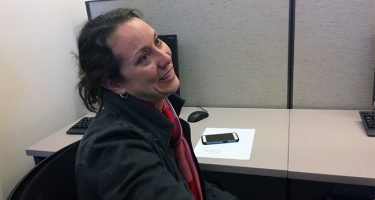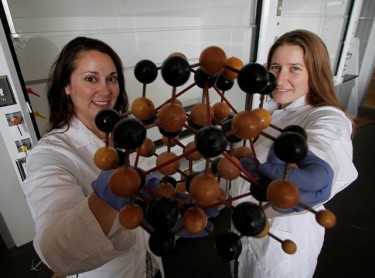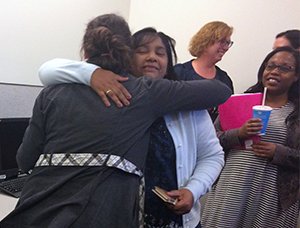
By Lana Sweeten-Shults
GCU News Bureau
Cindy Seminoff remembers the day she and fellow College of Science, Engineering and Technology faculty member Melissa Beddow decided they were all in.
“We were co-workers at the time. I told her, ‘I’m getting ready to sign up.’”
Beddow was thinking the same thing.
“She basically wrangled me in,” said Seminoff with a laugh of her and Beddow, who entered Grand Canyon University’s doctoral program together, along with a third GCU faculty member, Veronica Perez in the College of Nursing and Health Care Professions.
“We did it initially just to be a support system,” Seminoff said.

“I convinced them to join me because I thought it would be fun to go through this process with some good friends,” said Beddow, who started her first doctoral class in January 2012 . “We were able to talk about the classes we were taking and help each other with assignments, as well as navigating the dissertation process.”
That support system hasn’t wavered. Perez is in the midst of the dissertation process. Seminoff – now Dr. Seminoff -- an exercise science professor, completed her doctoral degree in 2016. And this December, it was Beddow’s turn.
Beddow – now forensic science professor Dr. Melissa Beddow – became the 500th doctoral learner whose dissertation received the University’s stamp of approval, complete with a gesture that symbolizes the long-fought process is won: a signature by Dr. Michael Berger, Dean of the College of Doctoral Studies, on her dissertation title page.
“We knew this was coming two or three months ago,” said Berger after signing Beddow’s dissertation page in a room full of her colleagues, many of them doctors themselves who know the soul- and mind-battering wherewithal it takes to reach this pinnacle in academia. “There has been this ongoing conversation about who it was going to be. … We had (dissertation) 498 and 499, then No. 500 came in for my review. It was Melissa’s.”
The University’s 500th dissertation is quite a milestone for the program, which saw its first doctor in education cohort get its start in 2008, graduated its first doctor of business administration in late 2010, and awarded its first doctor of philosophy degree in spring 2011.
“We’re probably going to end up at 180 total (doctoral graduates) in 2017, give or take a few,” Berger said. “… That’s by far the biggest year for doctoral graduates.”
Before her higher education career, Beddow worked as a DNA analyst in private laboratories. As such, she has testified in numerous criminal cases.
“I love a lot about forensic science,” said Beddow, who is the Director of the Bachelor of Science in Forensic Science program. “It brings together so many different scientific concepts. Anyone who pursues a degree in forensic science is a master of many different scientific areas. We utilize chemistry, biology, physics and math in many different disciplines. We’re kind of a jack-of-all-trades, so to speak.
“It’s amazing to be part of a community that utilizes science in order to identify a perpetrator or link one to a criminal event.”

The doctoral process has been a long one for her.
“I took two breaks when I had two children, so that added to it,” she said.
Between researching and writing her dissertation, she gave birth to two sons and took an eight-month break in between each.
“I would spend weekends writing papers and doing my work. When my first son came, I remember sitting at the table one weekend trying to write a paper while my husband and son were playing. I knew this wasn’t going to work, and I had to change when I would get my schoolwork done,” Beddow said. “Even with setting aside dedicated time for school, things would come up that I would have to physically or emotionally work around – illness, injury, the loss of our beloved cat.”
The hardest part of the process for her, she said, was managing her time. She also hit a road bump academically during the doctoral process – enough for her to drop from the program for a short time, while pregnant with her second child. She was stuck in the proposal phase for several months, but after being assigned a new doctoral chair and promising she “would be her hardest working student," she got her second wind.
“Her support, along with the rest of my committee, kept me going when times were tough.”
Her dissertation is on “The Portrayal of DNA Testing in the Forensic Crime Show ‘Bones,’” not that analyzing television crime shows was an easy pick for a dissertation.

“I bounced back and forth,” she said, before finally settling on the topic that would occupy the next five years of her life. “I had a lot of ideas. There were lots of studies I wanted to do.”
When she started looking at fictional forensic science shows on TV, she realized “no studies had been done outside of the ‘CSI’ franchise and not a lot of research had been done on those shows themselves. I was surprised there was not enough research on the shows’ actual content,” Beddow said.
She decided to focus on the CSI Effect, a belief, mainly among law enforcement personnel and prosecutors, that such television crime dramas influence American jurors to expect more and more forensic evidence to help them convict defendants of crimes.
She says viewers “see what’s going on in shows, and they think that it’s real.”

Beddow said she watched about 20 hours of “Bones,” analyzing how DNA testing and analyses were portrayed.
“It was either completely fabricated or just unrealistic,” she said
Beddow was asked to meet Berger in an adjunct faculty area in the CSET building recently to answer a few questions about her dissertation.
When she looked up, she saw the CSET faculty and other friends and family gathered behind her, clapping and congratulating her on her latest accomplishment.
“I knew there was a meeting (of the CSET faculty). I thought they were just changing rooms,” said Beddow, tears in her eyes after Berger signed her dissertation and after seeing such support from her fellow faculty members.
One faculty member in particular, Seminoff, is finding that her and Beddow's academic lives are paralleling each other once again, post dissertation. This time they’re both teaching the same class, SCI 150, which is critical analyses in science.
That support system, once again, is in place.
“I’m so proud of her – so happy for her,” said Seminoff.
You can reach GCU senior writer Lana Sweeten-Shults at (602) 639-7901 or at [email protected]. Follow her on Twitter @LanaSweetenShul.



































































